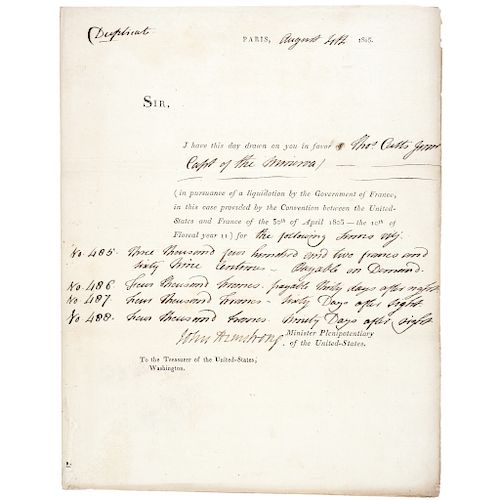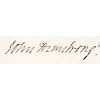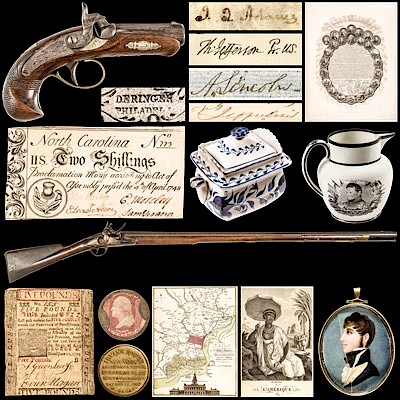JOHN ARMSTRONG,1805-Dated, Document Signed
Lot 2
About Seller
Early American History Auctions
1520 Commerce St., #312
Winchester, VA 22601
United States
Categories
Estimate:
$800 - $1,000
Absentee vs Live bid
Two ways to bid:
- Leave a max absentee bid and the platform will bid on your behalf up to your maximum bid during the live auction.
- Bid live during the auction and your bids will be submitted real-time to the auctioneer.
Bid Increments
| Price | Bid Increment |
|---|---|
| $0 | $10 |
| $200 | $20 |
| $300 | $25 |
| $500 | $50 |
| $1,000 | $100 |
| $2,000 | $200 |
| $3,000 | $250 |
| $5,000 | $500 |
| $10,000 | $1,000 |
| $20,000 | $2,000 |
| $30,000 | $2,500 |
| $50,000 | $5,000 |
| $100,000 | $10,000 |
| $200,000 | $20,000 |
| $300,000 | $25,000 |
| $500,000 | $50,000 |
About Auction
By Early American History Auctions
Oct 19, 2019
Set Reminder
2019-10-19 12:00:00
2019-10-19 12:00:00
America/New_York
Bidsquare
Bidsquare : Historic Autographs-Currency-Political-Americana-Militaria-Guns
https://www.bidsquare.com/auctions/early-american-history-auctions/historic-autographs-currency-political-americana-militaria-guns-4513
326 Lots of Rare, Historic Autographs, Americana, Civil War Era, George Washington, Abraham Lincoln, Black History, Revolutionary War Era, Colonial America, Federal Period, War of 1812, Colonial Currency, Indian Peace Medals & more... Early American History Auctions auctions@earlyamerican.com
326 Lots of Rare, Historic Autographs, Americana, Civil War Era, George Washington, Abraham Lincoln, Black History, Revolutionary War Era, Colonial America, Federal Period, War of 1812, Colonial Currency, Indian Peace Medals & more... Early American History Auctions auctions@earlyamerican.com
- Lot Description
Autographs
"John Armstrong" as Minister Plenipotentiary of the United States
JOHN ARMSTRONG (1758-1843). President James Madison's Secretary of War and a Brigadier General during the War of 1812, Soldier in the Revolutionary War, Pennsylvania Delegate to the Continental Congress, United States Senator and American Diplomat as Minister Plenipotentiary to France.
August 4, 1805-Dated Federal Period, Partially-Printed Document Signed, "John Armstrong" as Minister Plenipotentiary of the United States, Choice Extremely Fine. Being a list of Monies Exchanged in France, measuring about 8.5" x 5.25" well written on fine quality laid period paper. This extremely rare fiscal Document reads, in full:
"Duplicate. -- Paris, August 4th, 1805.
Sir, -- I have this day drawn on you in favor of Thos. Cutts Junior, Capt. of the Minerva (in pursuance of a liquidation by the Government of France, in this case provided by the Convention between the United States and France of the 30th of April 1803- the 10th of Floreal Year II) for the following items only:
No. 405. Three thousand four hundred and two francs and sixty nine centimes payable on demand.
No. 406. Four thousand francs, payable thirty days after sight.
No. 407. Four thousand francs, payable sixty days after sight.
No. 408. Four thousand francs, payable ninety days after sight. --
(Signed) John Armstrong, Minister Plenipotentiary of the United States. -- To the Treasurer of the United States, Washington."
Folds with toning around edges and also on verso at folds. Possible paper remnant at lower left.
John Armstrong, Jr. (November 25, 1758 - April 1, 1843) was an American soldier and statesman who was a delegate to the Continental Congress, U.S. Senator from New York, and Secretary of War.
The young Armstrong initially joined a Pennsylvania militia regiment and the following year he was appointed as aide-de-camp to General Hugh Mercer of the Continental Army. In this role, he carried the wounded and dying General Mercer from the field at the Battle of Princeton. After the general died on January 12, 1777, Armstrong became an aide to General Horatio Gates. He stayed with Gates through the Battle of Saratoga then resigned due to problems with his health. In 1782 Gates asked him to return. Armstrong joined General Gates' staff as an aide with the rank of major, which he held through the rest of the war.
While in camp with Gates at Newburgh, New York, Armstrong became involved in the Newburgh Conspiracy. He is generally acknowledged as the author of the two anonymous letters directed at the officers in the camp.
Later in 1783 Armstrong returned home to Carlisle. He was named the Adjutant General of Pennsylvania's militia and also served as Secretary of the Commonwealth of Pennsylvania under Presidents Dickinson and Franklin. In 1787 and 1788 he was sent as a delegate for Pennsylvania to the Continental Congress.
When the War of 1812 broke out, Armstrong was called to military service. He was commissioned as a Brigadier General, and placed in charge of the defenses for the port of New York. Then in 1813 President Madison named him Secretary of War.Armstrong made a number of valuable changes to the armed forces but was so convinced that the British would not attack Washington that he did nothing to defend the city even when it became clear it was the objective of the invasion force. After the destruction of Washington, Madison, usually a forgiving man, forced him to resign in September 1814.
- Shipping Info
-
Early American provides in-house worldwide shipping. Please contact us directly if you have questions about your specific shipping requirements.
-
- Buyer's Premium



 EUR
EUR CAD
CAD AUD
AUD GBP
GBP MXN
MXN HKD
HKD CNY
CNY MYR
MYR SEK
SEK SGD
SGD CHF
CHF THB
THB












